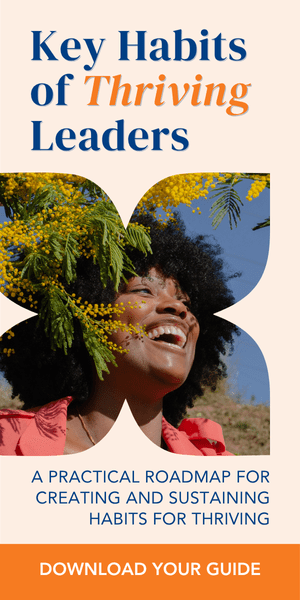“Who are you uninterrupted?” That question stopped me in my tracks.
It was raised by Zee Clark during a webinar panel Wisdom Works recently hosted to explore what it means to thrive as a Black leader in today’s workplaces. Formerly a leader in Fortune 500 companies, Zee is a breathwork and resilience expert, plus author of the groundbreaking book Black People Breathe.
Her question calls us to consider the deep sense of thriving that’s possible within ourselves when we aren’t interrupted by the biases and pressures of workplaces that don’t understand and embrace who we are.
During the webinar, our esteemed panel shared many visible and invisible roadblocks that erode the thriving and effectiveness of Black leaders. Four of those barriers are:
1. The Narrow Lens Pigeonholing Black Leaders
Corporate refrains to “bring your authentic self to work” are a farce if they don’t allow people to show up authentically. This means honoring: Every person brings a diversity of joys, struggles, backgrounds, traumas, and talents to work. Yet, Aaronde Creighton, Chief Diversity Officer at the Leadership Circle, stated Black people are too often seen through a narrow lens. “Black people are not a monolith. Because of an experience a coworker has with one Black person, they tend to ascribe that to all other Black people.”
Dr. Carol Labor, Founder of H.E.R. Wellness and Sierra Leone’s Presidential Advisor on Mental Health, added that Black women are frequently branded as too loud, too strong, too opinionated. This Angry Black Woman stereotype not only harms the lives and livelihoods of Black employees, as this Harvard Business Review article highlights, companies may “miss out on the full contribution of Black women in their organizations because of this image.”
2. A History of Resilience Now Eroding Black Health
As our webinar shifted to the topic of resilience, Aaronde exclaimed, “When it comes to Black people, we were built for this sh*t. We have endured so much over centuries of time, that this [resilience] is what we were built for.” The problem with this is, he went on to say, “We don’t always recognize when we’re having our own mental health episodes because we’re encouraged to just push through it and push beyond it.” It’s time to relook at the tropes of Strong Black Man/Strong Black Woman and acknowledge, “You don’t have to do this by yourself. It’s ok to take a breather. It’s ok for you to talk to somebody.”
Dr. Carol and Zee both agreed, saying that Black people are trained as children to push through systemic racism, and this includes the biases, racial microaggressions, and other forms of marginalization they may experience as adults at work. For example, Zee shared the term, career-lynching, the divisive practice of a Black employee getting fired or disgraced when they are perceived as threatening to those in a white dominant work culture. Recent research released by Indeed also shows that one in four Black workers feel they have to code-switch to conform to white standards—and that not doing so would negatively impact their careers.
The cumulative, repeated stressors Black employees experience can have a significant health and wellbeing cost. Termed weathering by University of Michigan Professor of Health Behavior & Health Education Dr. Arline Geronimus, Black people show, for example, higher rates of high blood pressure, inflammation, diabetes, disability, anxiety, and depression, as well as lower life expectancy than their middle- and upper-class white counterparts. Black women suffer a “double jeopardy” of even greater stress exposure as they face combined racial and gender discrimination.
“Black Joy is revolutionary because of all that it must resist and the ways that it must persist in order to simply exist.” –Carlton Mackey, creator of Black Men Smile®
3. Being the Only
Zee emphasized that Black leaders don’t just have to perform but outperform their white colleagues to rise in the company ranks. A few statistics to ground her claim: Although Black CEOs on the Fortune 500 reached a record high in 2023, that still means only eight Black executives (or 2%) are at the top of our world’s largest corporations. McKinsey forecasts that, given the current trajectory of underrepresentation and lack of support for Black leaders and workers in the U.S. private sector alone, it will take 95 years for Black employees to achieve talent parity.
For Black leaders who want to move up the ladder, Aaronde explained that the challenge is compounded: “There is a stress, strain, and pressure that happens especially for Black leaders as we ascend into higher levels of organizations. And as we ascend, we don’t always see people that look like us. Therefore, there’s not necessarily a modeling or understanding that can happen as I’m interacting with other leaders at my level. And the isolation that can cause is extremely wearing on people.” Strong social peer bonds are essential for the wellbeing of all people no matter what level in an organization; being “the only” can be a recipe for burnout.
4. Hiring for Difference, But Managing for Sameness
Dr. Carol stated, “Not every Black person comes from the same background.” Smart organizations seek and respect the differences of all team members, including Black employees, because they know that diversity drives innovation, decreases groupthink, and enhances performance.
What’s more, according to a Glassdoor workplace survey, more people than ever are seeking diverse, inclusive teams, so it’s bewildering that these teams aren’t common practice. Aaronde stressed, “Whether you’re talking about specifically Black leaders, other ethnic groups, neurodiverse, LGBTQIA+, whatever the case is, most organizations hire for difference, but manage to sameness. We hire for someone who looks different, acts different, is different from us. But once they come into the organization, we manage them like everybody else in the organization.”
When our work culture defaults to standards of whiteness, it closes the door to other cultural norms. We fail to tap into the company’s greatest asset: The unique wisdom people can bring to every part of the organization because of their differences.
Learn more about the barriers Black leaders experience, as well as recommendations for positive change by watching the webinar here.
We’re Advancing Leadership That Empowers All People to Thrive
Massive human studies, such as the Human Genome Project, tells us we are 99% identical at the level of our DNA. Neuroscience and wisdom traditions say we’re all connected. Yet, in societies across the globe, we continue to diminish and exclude each other. In doing so, we make each other small and limit what we could accomplish together.
At Wisdom Works, we’re promoting a better model of leadership, one which stewards environments where all people can succeed and thrive. Our mission is rooted in a deep belief about the inherent worth and dignity of all human beings, and we’re growing a network of leaders and leadership development practitioners around the world who want to contribute to a radical change in mind, heart, and behaviors in how leadership is demonstrated around the world.
We are grateful you are on this journey with us.






